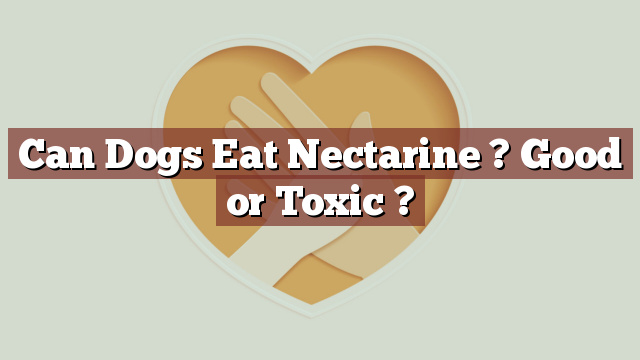Can Dogs Eat Nectarines? Good or Toxic?
As responsible pet owners, it is crucial to be aware of the foods that are safe and suitable for our furry companions. While dogs have different dietary requirements than humans, it is common for them to show interest in the fruits we enjoy, such as nectarines. But can dogs safely consume nectarines? In this article, we will delve into the nutritional value of nectarines, unveil any safety concerns or potential toxicity, discuss the risks and benefits, and provide guidance on what to do if your dog happens to eat a nectarine.
Nutritional Value of Nectarines: Essential Vitamins and Antioxidants
Nectarines are packed with essential vitamins and antioxidants that can contribute to a healthy diet for humans. They are a rich source of vitamin C, which helps boost the immune system and promote overall health. Additionally, nectarines contain dietary fiber, potassium, and other beneficial nutrients. However, it is important to remember that dogs have different nutritional needs, and the appropriateness of nectarines for them may differ.
Can Dogs Eat Nectarines? Unveiling Safety Concerns and Toxicity
Can dogs eat nectarines? The answer is yes, but with caution. While nectarines themselves are not toxic or harmful to dogs, certain parts of the fruit can pose risks. The pit or seed of the nectarine contains a compound called amygdalin, which can release cyanide when ingested. Cyanide can be extremely harmful or even fatal to dogs. Therefore, it is crucial to ensure that the pit and the surrounding area are completely removed before offering nectarines to your furry friend.
Potential Risks or Benefits: Digestive Issues and Health Benefits
Feeding dogs nectarines in moderation can have potential health benefits. The fruit is low in calories and fat, making it a suitable treat for overweight or obese dogs. The fiber content in nectarines can aid in digestion and promote regular bowel movements. However, excessive consumption may lead to digestive issues such as diarrhea or upset stomach. As every dog is unique, it is important to monitor their reaction to nectarines and adjust the portion size accordingly.
What to Do if Your Dog Eats Nectarines: Monitor Symptoms and Seek Veterinary Advice
If your dog accidentally consumes a nectarine, it is important to monitor their behavior and any potential symptoms. Signs of cyanide poisoning may include difficulty breathing, rapid breathing, dilated pupils, bright red gums, and seizures. If you notice any of these symptoms or suspect that your dog has ingested the pit, it is crucial to seek immediate veterinary assistance. A professional will be able to provide the necessary guidance and potentially administer treatment to ensure your dog’s safety and well-being.
Conclusion: Moderation is Key – Nectarines Can Be Enjoyed Safely by Dogs
In conclusion, while nectarines can be enjoyed safely by dogs, it is crucial to exercise caution and adhere to certain guidelines. Always remove the pit and any surrounding areas before offering nectarines to your dog. Monitor their behavior and consult a veterinarian if any symptoms of cyanide poisoning arise. Moderation is key, as excessive consumption may lead to digestive issues. By following these precautions, you can safely incorporate nectarines into your dog’s diet as an occasional and enjoyable treat.
Thank you for investing your time in exploring [page_title] on Can-Eat.org. Our goal is to provide readers like you with thorough and reliable information about various dietary topics. Each article, including [page_title], stems from diligent research and a passion for understanding the nuances of our food choices. We believe that knowledge is a vital step towards making informed and healthy decisions. However, while "[page_title]" sheds light on its specific topic, it's crucial to remember that everyone's body reacts differently to foods and dietary changes. What might be beneficial for one person could have different effects on another. Before you consider integrating suggestions or insights from "[page_title]" into your diet, it's always wise to consult with a nutritionist or healthcare professional. Their specialized knowledge ensures that you're making choices best suited to your individual health needs. As you navigate [page_title], be mindful of potential allergies, intolerances, or unique dietary requirements you may have. No singular article can capture the vast diversity of human health, and individualized guidance is invaluable. The content provided in [page_title] serves as a general guide. It is not, by any means, a substitute for personalized medical or nutritional advice. Your health should always be the top priority, and professional guidance is the best path forward. In your journey towards a balanced and nutritious lifestyle, we hope that [page_title] serves as a helpful stepping stone. Remember, informed decisions lead to healthier outcomes. Thank you for trusting Can-Eat.org. Continue exploring, learning, and prioritizing your health. Cheers to a well-informed and healthier future!

